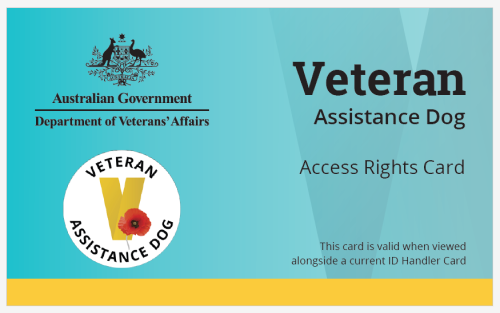Improving access for DVA assistance dogs

DVA’s Psychiatric assistance dogs have a profound impact on the day-to-day lives of veterans living with post-traumatic stress disorder (PTSD). These highly trained animals provide support that allows a veteran to safely participate in personal and public activities.
However, veteran handlers have sometimes faced challenges, with businesses and service providers denying them entry to public spaces with their assistance dog. While the dogs wear coloured coats and identifying badges in public, there is currently no national standard to identify accredited assistance dogs.
In response to feedback and concerns from veterans, DVA has developed an Access Rights Card for veterans to present to local operators when they are questioned or refused entry.
The wallet-sized card aims to alleviate issues faced by veterans with accessing public spaces with their dog by educating businesses and service providers that it is an offence to deny entry to a trained assistance dog under the Disability Discrimination Act 1992.
To be trialled over 12 months, the card has been mailed out to all program graduates of the Psychiatric Assistance Dogs Program, and will be issued to veterans who graduate during 2025.
Psychiatric assistance dogs are at their handler’s side at all times, whether to wake a veteran from a night terror, scan the environment for the veteran to reduce hypervigilance, or provide a barrier between the veteran and the public to induce a feeling of safety. To allow them to do their job, assistance dogs are legally allowed to enter public places, including travelling on public transport.
For more information, please go to the Assistance Dogs and Public Access Rights page of the DVA website.